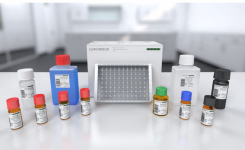BD Diagnostics have announced the availability of the CE-marked BD MAX™ StaphSR assay with eXTended Detection Technology in Europe for use on the fully-automated BD MAX™ System. The assay with eXTended detection accurately identifies Staphylococcus aureus and methicillin-resistant Staphylococcus aureus (MRSA) from nasal swabs in surgical patients at risk for colonization. This is the only commercially-available molecular assay that detects both the MREJ target that is found only in MRSA and drug-resistance genes: mecA and the recently discovered mecC cassette.[i]
Surgical site infections (SSIs) are the most common healthcare-associated infection in surgical patients.[ii] These infections are associated with increased length of hospitalization of seven to ten days with attributable costs as high as $29,000 per episode.[iii] Patients who develop an SSI have a two-to-eleven fold higher risk of death, compared with surgical patients without an SSI.[iv] Nasal carriage of S. aureus is a well-defined risk factor for subsequent infection in surgical patients. Rapid screening and targeted decolonization decreases SSIs and improves clinical and economic outcomes for surgical patients.[v]
“The rapidly expanding menu on the fully-automated BD MAX™ System provides hospital laboratories a flexible, efficient and cost-effective solution for accurate molecular testing,” said Tom Polen, President, BD Diagnostics - Diagnostic Systems. “The BD MAX™ StaphSR assay can be performed in the same run as MRSA, Clostridium difficile and other assays, enabling laboratories the flexibility to consolidate molecular testing on a single platform to improve overall efficiencies and costs.”
With results available in about two hours compared to two days with culture methods, the BD MAX™ StaphSR assay provides accurate and timely detection of colonized patients. Assays that do not detect mecC strains are prone to false-negative results.[vii]The BD MAX™ StaphSR assay also includes mecA to ensure accurate detection of “dropout” strains that have lost that gene and can remain undetected by other methods.
The BD MAX™ System is the first and only fully-automated, bench-top molecular system designed to perform a broad range of molecular tests. The growing menu of assays includes BD MAX™ MRSA for the detection of MRSA and BD MAX™ Cdiff for the detection of toxigenic Clostridium difficile. Introduction of the BD MAX™ StaphSR assay into the European market represents BD's commitment to rapidly expand its menu, offering laboratories a broad range of molecular tests that meet both their current and future clinical needs.
References: [i]Laurent et al., Emerging Infectious Disease 2012;18:1465-1467 [ii]Mangram et al.,. Infect Control Hosp Epidemiol. 1999;20:247-280 [iii]Anderson et al., Infect Control Hosp Epidemiol 2008; 29:S51-S61 [iv]Anderson et al., Infect Control Hosp Epidemiol 2008; 29:S51-S61 [v]Bode et al., N Engl J Med 2010;362:9-17 [vi]Van Rijen et al., PLoS ONE 2012;7(8): e43065 [vii]Garcia-Alvarez et al., Lancet Infect Dis. 2011;11:595-603






















